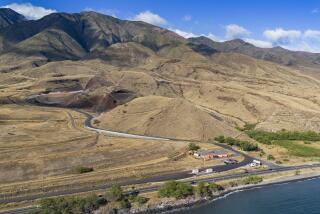Wash. Governor Refuses to Let Ship Unload Waste
- Share via
SEATTLE — A ship carrying 110 tons of PCB-tainted waste already rejected by Canada will not be unloaded until the Pentagon guarantees the material won’t stay here, Gov. Gary Locke said Thursday.
The waste, from U.S. military bases in Japan, arrived Wednesday night and was greeted by some two dozen protesters. Scientific studies have linked PCBs, or polychlorinated biphenyls, to cancer.
“We will not support the unloading of that ship until we get assurances the material will not be in the state any longer than two weeks and that they have identified a final destination, or it goes back to Japan,” Locke said.
“We understand the governor’s concerns, and we are continuing to work with his office to try and find a solution to the situation,” said Army Lt. Col. Steve Campbell, a Pentagon spokesman.
Campbell said earlier Thursday that there was no final destination for the waste, which was rejected by Canada only after the M/V Wan He set sail from Yokohama, Japan, on March 23.
Longshoremen already had refused Thursday to unload the 14 containers of electrical transformers and other PCB-tainted material after the EarthJustice Legal Defense Fund filed a 60-day notice of intent to sue and warned that all involved in unloading could face fines of $25,000 per day, said Scott Reid, president of Local 19 of the International Longshore and Warehouse Union.
The ship carrying the waste had been scheduled to dock in Vancouver, British Columbia. When that was rejected by the Canadian government, the Department of Defense received permission from the Environmental Protection Agency on Wednesday to temporarily store the waste in a Seattle warehouse.
The incineration contractor, Trans-Cycle Industries of Pell City, Ala., referred all questions Thursday to the Department of Defense.
PCBs were used in heavy electrical equipment and other industrial applications. But the federal government banned their use in 1977 because they were linked to cancer in laboratory animals.
More to Read
Sign up for Essential California
The most important California stories and recommendations in your inbox every morning.
You may occasionally receive promotional content from the Los Angeles Times.













